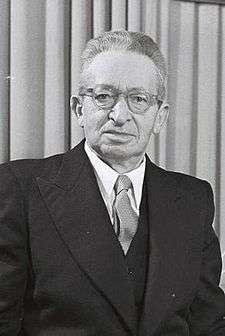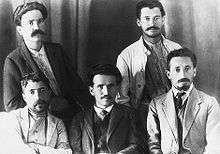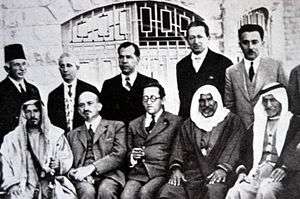Yitzhak Ben-Zvi
| Yitzhak Ben-Zvi יצחק בן־צבי | |
|---|---|
 | |
| 2nd President of Israel | |
|
In office 16 December 1952 – 23 April 1963 | |
| Prime Minister |
David Ben-Gurion Moshe Sharett David Ben-Gurion |
| Preceded by | Chaim Weizmann |
| Succeeded by | Zalman Shazar |
| Personal details | |
| Born |
24 November 1884 Poltava, Russian Empire |
| Died |
23 April 1963 (aged 78) Jerusalem, Israel |
| Nationality | Israeli |
| Political party | Mapai |
| Spouse(s) | Rachel Yanait |
| Children | 2 |
| Alma mater | Istanbul University |
| Religion | Judaism |
| Signature |
 |
Yitzhak Ben-Zvi (Hebrew: יצחק בן־צבי Yitshak Ben-Tsvi; 24 November 1884 – 23 April 1963) was a historian, Labor Zionist leader and the second and longest-serving President of Israel.
Biography
Born in Poltava in the Russian Empire (today in Ukraine), Ben-Zvi was the eldest son of Zvi Shimshelevich, who later took the name Shimshi. Shimshi was a leading Zionist activist and one of the organizers of the first Zionist Congress in 1897, who, in 1952, was honored by the first Israeli Knesset with the title "Father of the State of Israel".
Ben-Zvi was active in the Jewish self-defense units organized in Ukraine to defend Jews during the pogroms of 1905, and joined the Poale Zion Zionist political party. He moved to Palestine in 1907, and later the same year was a representative in the Zionist Congress at The Hague. It was there that he first met Israel Shochat. Ben-Zvi emigrated to Palestine and settled in Jaffa. "Bar-Giora", the clandestine precursor to Hashomer, was created in his apartment in 1907. In 1909, he organized the Gymnasia Rehavia high school in the Bukharim quarter of Jerusalem together with Rachel Yanait.

In 1910 Yanait, Ben-Zvi and Ze'ev Ashur founded the Ahdut, the first Hebrew socialist periodical. Following his studies at Galatasaray High School in Istanbul, from 1912 to 1914 Ben-Zvi studied law at Istanbul University, together with the future Israeli prime minister David Ben-Gurion. They returned to Palestine in August 1914, but were expelled by the Ottoman authorities in 1915. The two of them moved to New York City, where they engaged in Zionist activities and founded the HeHalutz (Pioneer) movement there. Together, they also wrote the Yiddish book The Land of Israel Past and Present to promote the Zionist cause among American Jewry.
Upon returning to Palestine in 1918, Ben-Zvi married Yanait. They had two sons: Amram and Eli. Eli died in the Arab–Israeli War, defending his kibbutz, Beit Keshet.
Political career



Ben-Zvi served in the Jewish Legion together with Ben-Gurion. In 1919, he helped found the Ahdut HaAvoda party, and became increasingly active in the Haganah. He was later elected to the Jerusalem City Council and president of the National Council, the shadow government of the Jewish community in Mandatory Palestine.
Murder of Jacob Israël de Haan
According to Avraham Tehomi, Ben-Zvi ordered the 1924 murder of Jacob Israël de Haan.[1]
De Haan had come to Palestine as an ardent Zionist, but he had become increasingly critical of the Zionist organizations, preferring a negotiated solution to the armed struggle between the Jews and Arabs. In Tehomi's opinion: "I have done what the Haganah decided had to be done. And nothing was done without the order of Yitzhak Ben-Zvi. I have no regrets because he [de Haan] wanted to destroy our whole idea of Zionism."[1]
Presidency

When Israel gained its independence, Ben-Zvi was among the signers of its Declaration of Independence on 14 May 1948. He served in the First and Second Knesset for the Mapai party. He was elected President of Israel on 8 December 1952, assumed office on 16 December 1952, and continued to serve in the position until his death.

Ben-Zvi believed that the president should set an example for the public and his home should reflect the austerity of the times. For over 26 years, he and his family lived in a wooden hut in the Rehavia neighborhood of Jerusalem. The State of Israel took interest in the adjacent house, built and owned by Nissim and Esther Valero, and purchased it, after Nissim's death, to provide additional space for the President's residence.[2] Two larger wooden structures in the yard were used for official receptions.
Research
In 1948, Ben-Zvi headed the Institute for the Study of Oriental Jewish Communities in the Middle East, later named the Ben-Zvi Institute (Yad Ben-Zvi) in his honor. The Ben-Zvi Institute occupies Nissim Valero's house.[3] His main field of research was the Jewish communities and sects of Asia and Africa, including the Samaritans and Karaites.
Commemoration and awards
In 1953, Ben-Zvi was awarded the Bialik Prize for Jewish thought.[4]
Ben-Zvi's photo appears on 100 NIS bills. Many streets and boulevards in Israel are named for him. In 2008, Ben-Zvi's wooden hut was moved to Kibbutz Beit Keshet, which his son helped to found, and the interior was restored with its original furnishings. The Valero house in Rehavia neighbourhood was designated an historic building protected by law under municipal plan 2097 for the preservation of historic sites.[5]
Family
Yitzhak Ben-Zvi's father, Zvi Shimshi (Shimshelevitch), was a leading Zionist activist in the 19th century. A member of the B'ne Moshe and Hoveve Zion movements in Ukraine, he was one of the organizers with Dr. Theodore Herzl of the first Zionist Congress in Basel, Switzerland in the fall of 1897. At this Congress, the World Zionist Organization was founded, and the intention to re-establish a Jewish state was announced. Shimshi was the only organizer of the first Zionist Congress to live to see the birth of the modern State of Israel in 1948. On 10 December 1952, Zvi Shimshi was honored by the first Israeli Knesset (parliament) with the title, "Father of the State of Israel".
Yitzhak Ben-Zvi's brother was the well known Jewish author, Aharon Ruveny, and his brother-in-law was the Israeli archaeologist, Prof. Benjamin Mazar.[6]
See also
- Works
- Rahel Yahait and Itzhak Ben-Zvi, (Jerusalem 1957)
- Rahel Yahait and itzhak Ben-Zvi, Coming Home, translated from Hebrew by David Harris and Julian Metzer, Tel Aviv, 1963
- David Harris and Julian Metzer, Derakhai Siparti, (Jerusalem, 1971)
References
- 1 2 Shlomo Nakdimon; Shaul Mayzlish (1985). דה האן : הרצח הפוליטי הראשון בארץ ישראל Deh Han : ha-retsah ha-politi ha-rishon be-Erets Yisraʼel / De Haan: The first political assassination in Israel (in Hebrew) (1st ed.). Tel Aviv: Modan Press. OCLC 21528172.
- ↑ Eilat Gordin Levitan. "Shimshelevitz Family". Eilatgordinlevitan.com. Retrieved 2013-04-17.
- ↑ Ben Zvi Institute, 12 Abarbanel St., Jerusalem
- ↑ "List of Bialik Prize recipients 1933–2004 (in Hebrew), Tel Aviv Municipality website" (PDF).
- ↑ Joseph B. Glass; Ruth Kark (2007). Sephardi entrepreneurs in Jerusalem : the Valero family 1800–1948. Jerusalem: Gefen Publishing House. ISBN 978-965-229-396-1. OCLC 191048781.
- ↑ Dan Mazar (1994) Jerusalem Christian Review
External links
| Wikimedia Commons has media related to Yitzhak Ben-Zvi. |
- Yitzhak Ben-Zvi Israel Ministry of Foreign Affairs
- English Online-catalog of the library of the Ben Zvi Institute
- https://www.jewishvirtuallibrary.org/jsource/biography/ben-zvi.html